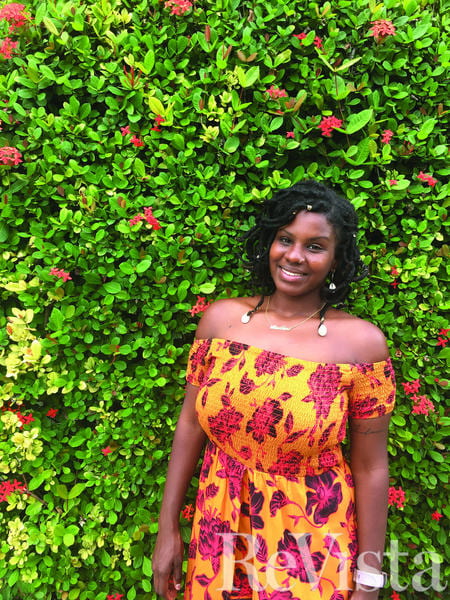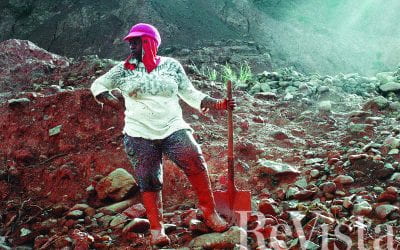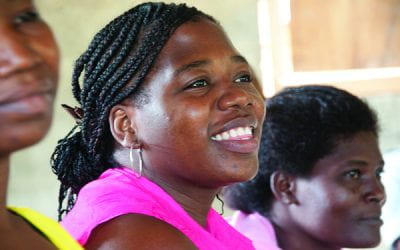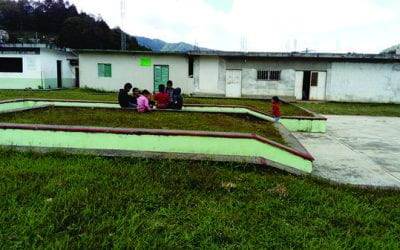“I Found My Island”: Field Reflections of a Black Nuyorican in Puerto Rico
I landed in San Juan for the first time as a young adult with a bright orange 52-pound suitcase, my dog Zora, and an eager excitement to be reunited with the island. My exhaustion from having recently survived my first year of graduate school—packed with required seminars, thousands of pages of readings, building new communities, and chronic imposter syndrome—was alleviated by the refreshing breezes cutting through the humid, Caribbean summer air. While I planned to conduct preliminary eldwork and brush up on my Spanish in anticipation of my future, yet very distant dissertation, this trip was also intimately personal.
Often during that summer, I found myself listening to the soundtrack of In the Heights often, a musical that I have seen four times, which narrates the stories of Caribbean Latinos in Washington Heights in New York City. In Lin Manuel Miranda’s Tony Award-winning musical, Dominican-American bodega owner Usnavi de la Vega yearns for a place that feels like home since his parents passed away. He hopes that by eventually going back to his parents’ homeland, he can find the feeling of home he is searching for. He dreams of his Cuban neighbor, the abuela of the block—Abuela Claudia—of returning to the Caribbean.
They sing:
Think of the hundreds of stories we’ll create/ You and I!. Ay…
[Abuela] We’ll find your island
[Usnavi] I’ll find my island sky
I’ll find my island. These lyrics resonated with me in the most cliché way throughout my summer but I couldn’t shake them. The essence of my academic interests in racial identity and black womanhood through the lens of beauty in the Latino Caribbean has been fueled by this same quest. I can trace these intellectual interests and questions back to an anthropology class I took in my first year of college. “The Black Church in the U.S.” course introduced me to Samiri Hernandez Hiraldo’s ethnography Black Puerto Rican Identity and Religious Experience about the black community of Loiza, Puerto Rico. I had never heard anyone mention black Puerto Ricans in a book or classroom. The book drew me to explore academia and research as a means to answer questions about my identity that I hadn’t consciously acknowledged.
For me, a third generation black Nuyorican, Puerto Rico itself was an unfamiliar place with an ubiquitous presence. I could identify puertorriquenidad in my home, my church, my childhood neighborhood, in my comfort food. Yet, people generally did not recognize me as Puerto Rican—I do not fit the (false) image of the light-skinned Latina people generally imagine Puerto Ricans to be. My insecurities of being a dark-skinned black girl led me to emotionally cling to Puerto Rican identity as a symbolic escape from being black. I also internalized the false conception of Puerto Rican and black as mutually exclusive categories. My research as an undergraduate indirectly addressed this insecurity and other questions I had about my family—why did my mom identify as black? Why did my grandma vehemently deny it?
By the end of my first year of college I had decided to major in African American studies and Latin American studies, but the disconnection between the two curricula was apparent. Puerto Rico was especially lost in this gap—widely regarded as racially mixed or ambiguous Latin American country, but also not perceived as Latin American enough due to its commonwealth status.
[Abuela] Dream of the seaside air! See me beside you there!
Think of the hundreds of stories we will share! You and I!
While my research throughout undergraduate studies quelled these identity crises, my summer in Puerto Rico still had a resonance of nding home which I expected to encounter through building community in my process research. On the one hand, I found this palpable connection I had been searching for on the island through food, through music, seeing elements of myself, my home and family. On the other hand, I faced the same questions and doubts about being Puerto Rican while there.
I recall one exchange in a restaurant where an elderly white man sitting at the table next to me said “bon appétit” once my food arrived. I simply replied “gracias.” He audibly gasped and asked me in Spanish where I learned Spanish. Continuing our exchange in Spanish, I told him I was Puerto Rican. He put his hands up, slightly crouching, dramatizing the slight attitude I gave off. He apologized and scurried off. I had a similar exchange when a man with skin complexion similar to mine asked me where I was from. I ignored his question and told him I was Puerto Rican—since I knew what he wanted to know was where to place me racially and ethnically, and how to make sense of a dark-skinned girl with locs in San Juan. He asked if I was from Loíza, a town east of San Juan known for its large Afro-Puerto Rican population. He seemed baffled when I said no.
Discourses of racial mixing, mestizaje, and whitening, blanqueamiento, attempt to rid the island of blackness, or compartmentalize it as folklore (Davilla 1997; Rivero 2005;Godreau, Cruz, Ortiz & Cuadrado 2008; Rodriguez-Silva 2012; Godreau 2015). My insecurities in being ‘too black’ to claim my Puerto Rican identity, then, were not just products of the misinformed racial imagination of Americans about black Puerto Rican identity; rather, they were products of global anti-blackness that did not skip over the island. My grandma’s distancing from her own blackness, for example, is intertwined in this systematic, sociopolitical ideology in Puerto Rico, the wider Latin American Caribbean and the entire Latin American region.
[Usnavi] “If you close your eyes that hydrant is a beach/ That siren is a breeze/ that’re escape’s a leaf on a palm tree!”
On the day that Usnavi plans to leave Manhattan to go to the Dominican Republic, he realizes his role in his community and the fact that New York is his home. Manhattan is his island. I had already reversed this idea of myself as a paradox based on narrow U.S-centered notions of race; and later realized, too, that my own quest for home and forged connection on the island was actually kind of nonsensical. This is not at all to say that black folks’ quest for a home(land) is not valuable or meaningful; but rather that the antiblack rhetoric that denies my relationship to this place does not have to be supplanted with a forced sense of belonging and cultural ownership. And, honestly, the same antiblack rhetoric is present in Puerto Rico in similar but distinct ways that deny black Puerto Ricans a sense of belonging in their own home. I can love Puerto Rico, everything it’s given me, how it has shaped me and my family while recognizing that trips to the island don’t make it my own in the way I had hoped when I arrived in San Juan. Being Puerto Rican from Brooklyn does not change the reality that I am the third generation in my family born and raised in the country that does try to claim Puerto Rico as its own while simultaneously ignoring it. This is made especially evident right now as I write this essay about being Puerto Rican with lights overhead and clean, running water in my house while Puerto Ricans on the island are suffering the devastating, life-threatening effects of Hurricane Maria in the exact moment that I type these words.
While my research on the (racialized, classed, gendered and sexualized) politics of beauty in Puerto Rico is driven by my experiences as a dark-skinned black Puerto Rican woman and has drawn me closer to this place that was once home for my family, I cannot lose sight of my positionality in relation to Puerto Rico. I left San Juan that summer with my bright orange suitcase, my dog Zora, and the comfort of embracing my identity as a black Nuyorican—in spite of insecurities embedded by anti-blackness—by claiming the island that continues to shape me, New York City.
[Usnavi] “I found my island/ I been on it this whole time/ I’m home!”
Winter 2018, Volume XVII, Number 2
Miari Taina Stephens is a second year Ph.D. student in African & African American studies with a primary field in Anthropology at Harvard University. She is interested in the politics of beauty, black womanhood and black feminisms in the Latino Caribbean. Her current work explores the politics of beauty and its entanglement with race, gender, class and sexuality in Puerto Rico.
Related Articles
Afro-Latin Americans: Editor’s Letter
My dear friend and photographer Richard Cross (R.I.P.) introduced me to the unexpected world of San Basilio de Palenque in Colombia in 1977. He was then working closely with Colombian anthropologist Nina de Friedemann, and I’d been called upon by Sports Illustrated to…
Witches, Wives, Secretaries and Black Feminists
The issue of gender has been front and center for me, both as a subject of my fieldwork on black politics in Latin America, and how I conducted that research, particularly in how I…
Compañeros En Salud
English + Español
I have lived in non-indigenous rural Chiapas in southern Mexico since 2013, working with Compañeros En Salud (CES)—a Harvard af liated non-profit organization that partnered with…





